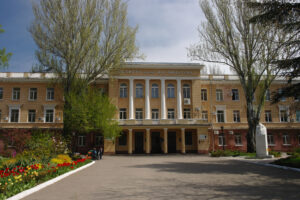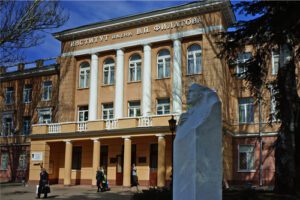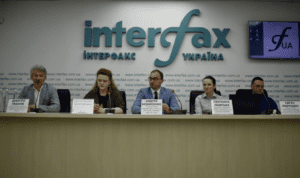
Doctors note an increase in the number of preventive examinations and referrals related to advanced forms of diseases.
“We are now seeing an increase in the number of preventive examinations in various areas. At the same time, we have a situation with surgical interventions for more advanced forms of problems,” Vadym Zukin, chief operating officer of the Leleka multidisciplinary medical center, told Interfax-Ukraine.
He emphasized that “in 2022, many Ukrainians cared less about their health for obvious reasons.”

“We are already feeling the negative impact of the war on public health. This applies even to those who were not directly affected by the war,” said the director of the medical center.
Zukin also noted that the clinic has seen an increase in demand for pregnancy management services.
“We predict that compared to the first half of 2023, the number of births in Kyiv will gradually increase over the next six months and in early 2024, but these figures will be quite far from the pre-war levels,” he said.
At the same time, according to Zukin, Ukraine currently has a “very strange situation with vaccination,” in particular due to a shortage of vaccines.
“Everyone recognizes that it is useful, patients are willing to pay for it themselves, but there is a significant shortage of many vaccines in Ukraine,” he said.
Commenting on the prospects for regional development, particularly in the de-occupied regions, Zukin noted that he currently sees no opportunities for regional development.
“Opening regional branches of the medical center requires significant investments. Moreover, our institution is 99% funded by patients’ donations. At the same time, we need to understand that quality medicine is quite expensive. Therefore, despite our great desire to help the population of the de-occupied territories, it is too early to talk about opening branches there,” he said.
At the same time, Zukin believes that “under the current conditions, it is impossible to launch medical institutions as serious market players in those areas.”
Commenting on the effectiveness of private clinics’ participation in the national healthcare system, Zukin noted that “private medicine can be very useful for the general healthcare system due to its high management efficiency and flexibility.”
In turn, Vadym Shekman, CEO of Dobrobut Medical Network, said that one of the recent trends is that “medicine, which used to develop more actively in Kyiv, is now developing in Ukrainian regions, because there is a demand for quality medicine everywhere.”
“We are looking at this carefully not only from the perspective of potential acquisition of interesting institutions, but also from the perspective of possible partnership with regional clinics for which we can be a center of expertise. In fact, our goal and dream is to build a medical network of such a scale that high-quality medical care will be available to Ukrainians wherever they are,” he said.
Mr. Shekman noted that Dobrobut Medical Network “has always seen itself as a national player.”

“The plans to enter other cities with medical centers remain in force. The war has made adjustments to these plans, they have shifted slightly in time. We will realize these intentions after our victory,” he said.
At the same time, commenting on the possible prospects of opening clinics in the de-occupied regions, Shekman noted that “private medicine implies that a person has to pay for medical services out of his or her own pocket, and accordingly, the appropriate economic situation should be created in the de-occupied cities.”
“We would be happy to open in the liberated Ukrainian territories as soon as the opportunity arises,” he said.
In general, Shekman believes that “it is impossible to create a high-quality medical system without involving business.”
“Our state simply will not have enough money in the budget to rebuild and create the healthcare system we need. Healthcare in the world is becoming more expensive every day, and we must be ready to meet these challenges. Today, private healthcare is developing in Ukraine because there is a demand for quality healthcare and services. It cannot be said that many private healthcare facilities are now working with the NHSU, as the packages it offers do not include all costs and are lower than the cost of private clinics,” he said.
Mr. Shekman emphasized the importance of the fact that “the state has started to move towards private business.”
“To attract foreign investment, we need to create a system that is attractive to investors, so that they understand not only what to invest in, but also how they can get their money back. And this does not mean that healthcare will be exclusively paid for – in the context of competition, the cost of services usually decreases. And today, let’s be honest, there is no free medicine in Ukraine,” he said.

For his part, Serhiy Katsan, deputy director of the Filatov Institute of Eye Diseases and Tissue Therapy of the National Academy of Medical Sciences of Ukraine (Odesa) for Scientific and Medical Work, noted that recent trends include the consequences of an increase in the number of patients admitted to the clinic “with advanced stages of eye diseases, with complications, which further leads to longer treatment periods, inability to overcome the disease with therapeutic methods, and the need for surgical treatment…”.
“First of all, this concerns patients with inflammatory diseases of the eye and ophthalmic oncology. The number of patients in the department of microsurgical treatment of children’s eye diseases has also increased,” he said.
FILATOV INSTITUTE, MEDICAL EXAMINATION, MEDICINE, SERGIY_KATSAN, Лелека

On May 24-26, 2023, the annual international scientific-practical conference “Filatov Readings – 2023” will be held, which is registered in the State Non-Commercial Enterprise “Center for Testing the Professional Competence of Specialists with Higher Education in the Fields of “Medicine” and “Pharmacy” under the Ministry of Health of Ukraine” and accredited by EACME. In addition to specialists from Ukrainian regions, leading ophthalmologists from Belgium, Bulgaria, Great Britain, Armenia, Greece, Egypt, Israel, Spain, China, Moldova, Netherlands, Germany, UAE, Poland, Portugal, Romania, USA, Turkey, Hungary, France, Switzerland, and Egypt will also participate.
The reports will discuss modern approaches and methods of diagnostics and treatment of eye diseases using the latest technologies. The scientific-practical conference with international participation “Filatov Readings-2023” is organized by “Ukrainian Society of Ophthalmologists” Public Organization and State Institution “Institute of Eye Diseases and Tissue Therapy named after A.N. Shupik. The program of the scientific-practical conference is dedicated to the priority problems of ophthalmology: corneal and anterior eye diseases, post-traumatic eye pathology, including combat trauma, cataract surgery, neuro-ophthalmology, ophthalmo-oncology, vitreoretinal pathology, pediatric ophthalmopathology, refractive and accommodation disorders, glaucoma and reconstructive surgery. Thus the scientific-practical conference with international participation “Filatov Readings-2023” will bring together well-known scientists, researchers, practitioners and specialists of related fields in order to exchange experience, expand professional contacts and business relations, which will contribute to the main result of medical science – improvement of public health and prevention of eye diseases.
The speaker Gerrit Melles, MD, PhD (Rotterdam, The Netherlands) will open the conference with a lecture, which is dedicated to Academician V.P. Filatov “How Nature would have seen our cornea win”.
At the “Filatov Readings – 2023” conference, meetings of professional societies will be held: Ukrainian Society of Ophthalmologists, Ukrainian Glaucoma Society, Union of Ukrainian Ophthalmosurgeons, Ukrainian Council of Young Scientists, European Contact Lens Society of Ophthalmologists (ECLSO), Polish Ophthalmological Society “Ophthalmology in the 21st Century” (POS), German Ophthalmological Society DOG, Association of Ophthalmologists of Moldova.
During the plenary and breakout sessions, the Ukrainian and foreign specialists will present their innovative solutions, inventions, improvements in ophthalmology. All the participants will get certificates.
Location: 49/51 French Boulevard, Odessa, State Institution “Institute of Eye Diseases and Tissue Therapy named after N.P. Filatov. Institute of Eye Diseases and Tissue Therapy named after V.P. Filatov NAMS of Ukraine.
Contacts:
Phone numbers for inquiries (048) 746-52-08
E-mail: filatovinstitut@ukr.net
State Institution “The Filatov Institute of Eye Diseases and Tissue Therapy of the National Academy of Medical Sciences of Ukraine. V.P. Filatov Institute of Eye Diseases and Tissue Therapy of the National Academy of Medical Sciences of Ukraine

Filatov Institute of Eye Diseases and Tissue Therapy of the National Academy of Medical Sciences of Ukraine (Odessa, Ukraine) received as humanitarian aid the drug melphalan for the treatment of retinoblastoma, an intraocular malignant tumor in children.
As the Interfax-Ukraine agency was informed at the clinic, the drug is used to treat this tumor with the Institute’s own combined polychemotherapy method which implies injecting the drug directly into the tumor in combination with general polychemotherapy. This method allows to save the eye affected by the tumor and even vision in 80% of cases, including those with retinoblastoma stage 3-4.
The drug used for intraocular injections is melphalan, which is produced by Aspen Pharmacare Holdings Limited.

“Unfortunately, recently it has been impossible to purchase melphalan for injections in Ukraine. The institute has taken active steps to obtain the drug,” the institute reported.
Obtaining the drug was made possible thanks to the efforts of Olga Nikitchenko, head of the patronage service of the Ukrainian Ministry of Foreign Affairs, Ukrainian Ambassador to South Africa Lubov Abravitova, and Stavros Nikolau, senior executive director of Aspen Group, with support from the We Stand with Ukraine Foundation.
“The drug was delivered to the Filatov Institute. And literally the next day the first patient received treatment to save his vision and life,” the clinic reported.
Retinoblastoma is an intraocular highly malignant retinal tumor that develops mainly in children in the first two years of life and accounts for 89.3% to 98.2% of all intraocular neoplasms in children. Retinoblastoma incidence rate in the world is currently 1 case per 10-15 thousands newborns.
Due to asymptomatic course of the disease the majority of children (85-86%) come to the clinics with far advanced stage of retinoblastoma and even up to now many clinics have considered that the only way to save the life of the child was to remove the tumor together with the eye.
Retinoblastoma treatment in Ukraine is carried out at the Department of Pediatric Ophthalmopathology of the Institute of Eye Diseases and Tissue Therapy named after Filatov Institute of Eye Diseases and Tissue Therapy. V.P.Filatov Institute of Eye Diseases and Tissue Therapy of NAMS of Ukraine”. In recent years, the clinic has treated about 300 children with retinoblastoma aged from three months to eight years. One child receives from three to 20 injections, depending on the stage of the disease.

The Institute of Eye Diseases and Tissue Therapy named after V.P. Filatov (Odesa) received medical devices and medicines as part of the Shelter Ukraine charitable initiative, which is being implemented by SiLab Ukraine, Valores Foundation, Teple Misto charitable organization, Vplyv charitable organization in cooperation with Razom For Ukraine.
The clinic told the Interfax-Ukraine agency thanks to this initiative, the institute, in particular, was able to obtain suture materials, medical devices and medicines.
The received medical devices and consumables are used, among other things, in corneal transplantation operations, said Halyna Drozhzhina, the head of the department of pathology and microsurgery of the cornea of the eye.
“Such interventions are almost always the patient’s last chance not to lose sight, and they can only be done with such tools,” she stressed.
She pointed out that during the COVID-19 pandemic and the start of the war, “people hesitated and turned to ophthalmologists at the wrong time.”
“The number of patients in need of such interventions has increased. Therefore, such assistance is extremely necessary for us, it will help prevent vision loss in dozens of patients from different parts of Ukraine,” she said.
The clinic stressed that during the war, the institute, like in peacetime, continues to provide highly specialized ophthalmological care to patients from all over Ukraine, including citizens who were evacuated from the zone of active hostilities.

The French Quantel medical, with the assistance of the Ukrainian Embassy in France, donated it to the Institute of Eye Diseases and Tissue Therapy named after Filatov (Odessa) as a humanitarian aid a new probe (sensor) for the Aviso apparatus for ultrasonic biomicroscopy of the anterior eye.
As Interfax-Ukraine was informed at the clinic, up to 5,000 patients need to be examined on the Aviso device annually, in particular, to detect and monitor the state of intraocular tumors and neoplasms of the conjunctiva of the eye.
In addition, the need for probe-assisted examination increases during the war for patients with trauma, foreign bodies in the anterior part of the eye, chemical and thermal burns.
In the spring of this year, the institute had an urgent need for a new sensor, since the existing one actually failed. The sensor for each device is made individually.
During the war, the clinic was not able to update the equipment on its own, in particular, due to funding limitations, the lack of a sensor in Ukraine, disruption of supply chains and delivery difficulties.
“Administration, doctors and patients of the clinic of the Institute of Eye Diseases and Tissue Therapy named after Filatov wholeheartedly express their gratitude to the General Director of Quantel medical, Mr. Jean-Marc GENDRE / Jean-Marc GENDRE and the company’s employees for the provided humanitarian assistance and the Embassy of Ukraine in France for their invaluable help and support,” the clinic emphasized.

The majority of medical experts, who had fled abroad due to the Russian full-scale invasion of Ukraine, have come back and continue to work, practitioners and experts in the sphere of medicine said during a roundtable discussion hosted by the Interfax-Ukraine News Agency on Thursday.
“For the moment, 98% of personnel are in place. Some of them left for western Ukraine or abroad in the first months of the war, however, today almost all of them have come back and continue to work,” Head of the Department of Cardiometabolic Diseases of the Clinic for Adults of the State Institution “Center for Pediatric Cardiology and Cardiac Surgery of the Ministry of Health of Ukraine,” PhD in Medical Sciences Yevhen Marushko said.
“Speaking about the personnel of the Filatov Institute, almost none of our employees left. Some 99% of our personnel stay here. There is a shortage of specialists in very specific profiles as there are few of them all over the country. If specialists, whom we already lack, leave, this has a negative impact on the level of medical assistance,” ophthalmologist of the highest category, head of the department of inflammatory pathologies of the eye and microsurgical treatment of their consequences at state institution “Filatov Institute of Eye Diseases and Tissue Therapy of the National Academy of Medical Sciences of Ukraine” Oleksandra Zborovska said.
In turn, Business Development Director of ADONIS medical group of companies Svitlana Lonska said that the majority of the personnel of private medical institutions have returned, while those who are abroad also plan to come back soon.
Despite the fact that a maternity hospital was destroyed during large-scale military operations in Kyiv region, the doctors did not suspend their work and had to deliver babies under emergency conditions, she stressed.
At the same time, Head of the Department of Nephrology and Renal Replacement Therapy of the National University of Health Protection, owner of the Nephrology Clinic, Professor Dmytro Ivanov noted that the doctors and senior staff, who have returned to Ukraine, thus proved the level of their reliability.
“In the first two months we lost more than 60% of doctors and around 75% nurses in Kyiv in the first two months. Almost no medical personnel remained in the districts of Ukraine where military operations were conducted. Around 90% of medical staff have returned as of today. I think this could be considered a criteria of reliability of doctors and senior staff, for example, heads of departments and chief doctors,” Ivanov said.
Chief Physician of the National Cancer Institute, PhD in Medical Sciences Andriy Beznosenko said that the patient flow significantly reduced at the National Center Institute in the first month of the war.
“We received 150 patients during the first month of the war, while last year we received 2,700 patients during the same period of time,” he said.
The expert also noted that the specialists of the National Cancer Institute do the utmost to monitor the situation with the oncology centers in the temporarily occupied territories.
“Today, Kherson, Melitopol, Mariupol oncology centers and the one in Krasnyi Luch are under occupation. They lack personnel and there are patients there. But there are no medicines for treatment and we are unable to deliver them,” Beznosenko said.
ADONIS, FILATOV INSTITUTE, ZBOROVSKA, БЕЗНОСЕНКО, ИВАНОВ, МАРУШКО